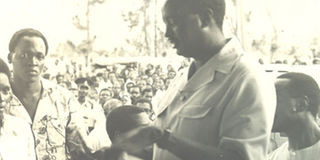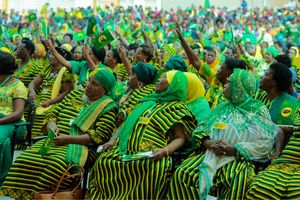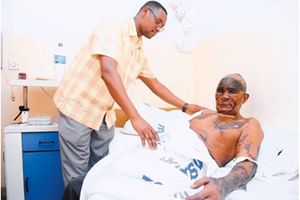Prime
Why Sokoine deserves a posthumous honorary doctorate

Former Prime Minister Edward Sokoine. It is 40 years since he died in a road accident near Dakawa on the Dodoma-Morogoro gighway on 12 April, 1984 as he travelled from Dodoma to Dar es Salaam. PHOTO I FILE
What you need to know:
- For his dedication to duty, for being principled, for making close follow-up on development activities, for instilling discipline in everybody, and for many other reasons, Sokoine needs to be considered for a doctorate.
The recent launch of a book on the life of former Prime Minister Edward Moringe Sokoine is an opportunity to think about the contributions of this son of Tanzania to the development of his country.
As has been observed by many commentators, the late Sokoine was a man of action, a person who wanted problems solved there and then; no dilly dallying; and in so doing, he did not expect accolades.
He was not associated with corruption; he did not amass wealth, and, it is said that he had just one house in his village of Monduli Juu at the time of his death. He was a simple man, no designer suits, or expensive cars. His main work ethic was work hard, work for results.
Sokoine operated during a period when the Ujamaa experiment in the country was facing problems. One area where action was required was public transport in large cities like Dar es Salaam.
The public company entrusted with providing public transport in the city was not living to the job. Pirate transporters, known as thumni thumni had cropped up, operating clandestinely. Sokoine stood up against the tide and allowed the operation of daladalas against major protests from UDA, the lame duck corporation which was overwhelmed by the burden of providing public transport.
We have been with daladalas ever since. It is believed that was he to be around today, we would see discipline not just with daladalas, but also within the transport sector in general, including public buses which are driven dangerously like they were airplanes.
Sokoine was so popular that when he resigned his post of Prime Minister on health grounds in 1980, the whole nation felt deprived.
The nation sighed in relief when he was re-appointed Prime Minister in 1983, but alas, this was to be a short-lived stint that ended in his tragic death in a road accident in 1984.
For his dedication to duty, for being principled, for making close follow-up on development activities, for instilling discipline in everybody, and for many other reasons, Sokoine needs to be considered for a doctorate.
Given that he cannot pursue a University course of study or research, the proposed doctorate has to be Honorary, or, as they have it in Latin, honoris causa.
A honorary degree is awarded by an institution of higher learning empowered to do so, to a person considered to have made a remarkable achievement in a certain area, of interest to society; somebody who has made a mark on the world in some way, be it in scholarship, public service, business, philanthropy, education, and so on. Sokoine would score well for his contribution to public service.
Universities do not entertain suggestions as to who should be awarded an honorary degree. They usually do not allow lobbying or campaigning, but Sokoine was a public figure who deserves such a conferment. Any interested University should carry out its due diligence, and convince itself that here is sufficient grounds to award an honorary degree.
The issue that could be of interest is whether you could give an honorary degree to somebody who has long passed away.
Well, regulations of many universities allow them to award such degrees posthumously, and there are many examples world-wide. The degree is collected by his family, just like the book on Sokoine’s life was presented by his family.
For example, the University of, the University of Edinburgh in the UK has recently given an honorary degree to Eric Liddell, a century after he won a gold medal in the Olympic games in 1924. Eric passed away many years ago in 1945, at the age of 43 (Sokoine died at the age of 46).
True, Sokoine is remembered in many ways. There is a University named after him; there are many other phenomena, such as roads, sports arenas, buildings and institutions carrying his name. Now we have a book.
However, a doctorate would add icing to the cake. It would encourage further research into his contribution to the nation and to his family and community. It would encourage the current generation to aspire to the living and commitment to duty that the late Sokoine had.
According to the Tanzania Commission of Universities, as of February 2024, there were 49 approved Universities in Tanzania; 19 public-owned and 30 private owned. Let them find it appropriate to have Edward Moringe Sokoine awarded a doctorate by their Universities.





